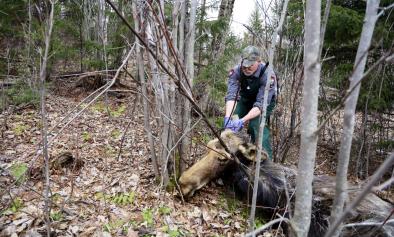Science Source
Hot dogs: High ambient temperatures impact reproductive success in a tropical carnivore
- States that while ecologists have mostly explored indirect effects of rising ambient temperatures on temperate and polar species, physiologists have predicted direct impacts on tropical species
- Predicts that African wild dog (Lycaon pictus) populations might be sensitive to weather conditions, because the species shows strongly seasonal reproduction across most of its geographical range
- Explores associations between weather conditions, reproductive costs, and reproductive success, drawing on long-term wild dog monitoring data from sites in Botswana, Kenya, and Zimbabwe
- Finds that high ambient temperatures were associated with reduced foraging time, especially during the energetically costly pup-rearing period
- Finds that across all three sites, packs which reared pups at high ambient temperatures produced fewer recruits than did those rearing pups in cooler weather
- Results show that over time, rising ambient temperatures at the (longest-monitored) Botswana site coincided with falling wild dog recruitment
- Findings indicate this species may be highly vulnerable to climate change
Related Content
Science Source
| Global Change Biology
Decadal-scale phenology and seasonal climate drivers of migratory baleen whales in a rapidly warming marine ecosystem
Daniel E. Pendleton, Morgan W. Tingley, Laura C. Ganley et al
Headline

May 19, 2022 | Climate Nexus Hot News
Climate Change Great For Winter Ticks, Very Bad For Moose Calves
Science Source
Climate change increases cross-species viral transmission risk
Colin J. Carlson, Gregory F. Albery, Cory Merow et al
Science Source
| Journal of Animal Ecology
Climate change affects bird nesting phenology: Comparing contemporary field and historical museum nesting records
John M. Bates, Mason Fidino, Laurel Nowak-Boyd et al


